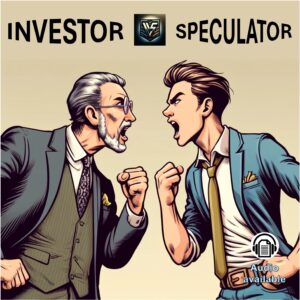After writing many lengthy articles, I sometimes feel overwhelmed. Deeper and detailed dive in the subject of investing, might lead to the perception that it is a complex and difficult process. Research has shown that an excess of information can hinder our decision-making abilities. This issue, known as “information overload” or “choice overload,” can paralyze our ability to make decisions, making it difficult to act at all (*see some research at the end of the article). Investing is actually quite simple.

I’ve previously mentioned that I typically favor safer, and perhaps to some, less thrilling methods of investment. In simpler terms, I prefer a conservative approach. However, these methods might only seem boring at first glance. Long-term investing requires the development of specific qualities that enable you to look beyond immediate financial reports, projecting not just six months ahead, but 5 to 10 years into the future. There’s a profound satisfaction in identifying an opportunity early, investing in it, and observing its growth over time. This involvement makes me feel deeply connected to the world; I understand its rhythms and am in tune with ongoing events—not merely a spectator on the sidelines. To me, this is the pinnacle of excitement.
Watch my TEDx talk here

AI and the Hidden Price of Comfort | Nik Popgeorgiev | TEDxFolsom
What if technology gave us everything we wanted—yet left us with nothing to live for? This talk explores the hidden cost of AI-driven automation: the quiet erosion of purpose, meaning, and struggle.
To convey this in a brief yet impactful way, I will refer to insights from some of the greatest minds — specifically those who recognize that conservative investing is like gravity. Despite being the weakest of the four fundamental forces, gravity exerts a universal influence that governs the motion of celestial bodies and structures the universe. Similarly, conservative investing strategies consistently generate stable, long-term wealth.
What I would like to do I present you with 5 quotes from well-known investors, people from the financial world, and a respective quote that matches in the meaning by a famous psychologist. The idea is to solidify the core qualities I feel are important for the success in the long game of conservative investing.
Patience
Warren Buffett: “The stock market is designed to transfer money from the Active to the Patient.”
Carl Jung: “Patience is not passive; on the contrary, it is active; it is concentrated strength.”
In my article “Time, Profit, and Contributions,” I argue that starting early and making regular contributions are powerful strategies that eliminate the need to chase high profits. Most investors understand that high potential profits, which by the way are never guaranteed, come with guaranteed higher risks. These risks often lead to tense situations, which in turn provoke strong emotions and result in hasty and erratic decisions. It is this chain of events that ultimately validates Warren Buffett’s observation. Carl Jung, who was consistently thorough in his professional life, recognized that true patience involves more than just waiting. Just as inaction can be a powerful form of action, maintaining patience and resisting the impulse to frequently adjust your portfolio is also a strong form of activity.
Long term vision
Seth Klarman: “The single greatest edge an investor can have is a long-term orientation.”
Angela Duckworth: “Grit is sticking with your future day in, day out, not just for the week, not just for the month, but for years, and working really hard to make that future a reality.”
Seth Klarman and Angela Duckworth both champion the virtues of persistence and long-term commitment, though their fields differ. Klarman, a renowned value investor, argues that the greatest advantage an investor can have is the ability to think and plan for the long term. This idea is echoed in the realm of psychology by Angela Duckworth’s concept of “grit,” which she describes as the relentless pursuit of long-term goals with passion and perseverance.
In my March 2024 newsletter, I introduced you to Duckworth’s TED talk where she explains that grit has been identified as the most crucial quality determining whether a student will succeed in their endeavors, surpassing even IQ as a predictor of success. Both perspectives highlight that whether in the complexities of financial investments or the pursuit of personal goals, success often depends on the ability to maintain focus and effort over extended periods. This pairing emphasizes the universal significance of endurance and foresight in achieving meaningful outcomes.
Discipline
Jason Zweig: “Being patient and disciplined with your investments, with a keen eye on the future, allows you to ride the waves of the market rather than being swamped by them.”
Walter Mischel: “The ability to delay gratification and resist short-term temptations in order to meet long-term goals is the single most important factor for lifelong success.”
Jason Zweig and Walter Mischel both emphasize the power of restraint and foresight in their respective fields of finance and psychology. Zweig, who is a financial journalist, actually understands pretty well human psychology. If you have read his book, “Your money, your brain”, which I have recommended before (https://nikpopg.com/book-reviews/) you will be astonished by the level to which Zweig delves into the intersection of psychology and investing. Zweig uses insights from neuroeconomics—a field that combines neuroscience, economics, and psychology—to explain why people make predictable mistakes in money management. A lot of them closely related with the lack of discipline.
Similarly, a true psychologist by education Walter Mischel highlights the significance of delaying gratification, noting that the ability to resist immediate temptations in favor of long-term objectives is key to achieving sustained success. Together, these quotes underscore the essential role of self-control and strategic planning in both managing investments and achieving personal goals, illustrating that the principles guiding successful outcomes in both areas are remarkably aligned.
Contrarian thinking
Howard Marks: “To achieve superior investment results, you have to hold non-consensus views regarding value, and they have to be accurate.”
Irvin D. Yalom: “Sometimes you have to go against the grain if you are going to grow.”
Howard Marks emphasizes the need for investors to adopt non-consensus views about value to outperform the market. This philosophy aligns well with the thoughts of existential psychologist Irvin D. Yalom, who suggests that personal growth often requires going against the prevailing trends or norms. Both Marks and Yalom highlight the courage and independent thinking needed to succeed in their respective fields—investing and personal development. This pairing illustrates that, whether in finance or life, stepping away from the crowd can lead to significant rewards.
This is not something new to us. In my articles “Only a few of us” and “Of course I can beat the market, but…” I talk about this visionary quality we need to possess. To be able to see what others can’t. It is that difference in opinions and expectations, that creates the potential for profits.
Being smart in your choices
Philip Fisher: “The stock market is filled with individuals who know the price of everything, but the value of nothing.”
William James: “The art of being wise is the art of knowing what to overlook.”
Philip Fisher and William James both offer insights into the importance of good judgment and prioritization, though in different areas. Fisher, a legendary investor, criticizes the shortsightedness among many in the stock market, where there’s a common focus on price without a true understanding of underlying value. His observation suggests that being a skilled investor involves recognizing what is truly valuable rather than just focusing on things that can be measured numerically. Echoing this sentiment from a psychological perspective, William James emphasizes wisdom as the ability to distinguish which details should be ignored in favor of more significant, impactful factors.
Both perspectives advocate for a deeper understanding and selective attention, whether in finance or in life’s choices, underscoring the importance of focusing on what truly matters for success and wisdom. In investing as well as in our everyday life, there are so many biases, or let’s call them automatic brain reactions, that often try to sabotage and derail us. In my series – “Biases and traps in investing”, I talk about known and common ones like – “The principle of following the herd, “Gambler’s Fallacy”, “Loss aversion and others”. Being aware of them gives us a higher chance to avoid them and stay away of making hasty and sometimes really stupid decisions.
*”information overload” or “choice overload,”
- Barry Schwartz – “The Paradox of Choice” – TED Talk – https://www.ted.com/talks/barry_schwartz_the_paradox_of_choice
- Sheena Iyengar and Mark Lepper (2000) – “When Choice is Demotivating: Can One Desire Too Much of a Good Thing?”
- Jacob Jacoby, Donald Speller, and Carol Kohn Berning (1974) – “Brand Choice Behavior as a Function of Information Load”





